Our pal Warren J. Cantrell over at 10rant.com is known for his over-the-top persona. This list will no doubt be as controversial as some of his other man-tastic past Top 10s. If you have an idea for your own Top 10, email me at eric@scene-stealers.com. Here’s Warren:
Like a regrettable relationship, sometimes the true nature of a film only pulls into focus after a healthy dose of time and perspective. What we once enjoyed and maybe even defended against less confused peers can sometimes emerge from the time-fog as a shamefully regrettable “phase” that etches an embarrassing low-water mark for all films (or romances) to follow. As it concerns movies, any number of factors can contribute to this miscalculation, be it awesome pre-release hype, back-seat-opinion influence, and/or genre stigma. The last of these is important, for it’s easy for both those making and watching a film to get lost in a popular trend or fad that invariably gets played out and cliché after the fifty or sixtieth re-tread. It is for this reason that a movie’s ability to “stand the test of time” is such an important factor in determining its worth: perfectly executed harmonies between performances, content, and cinematic craftsmanship rare in films even to this day. Some films pulled this feat off and continue to do so even after a few decades on the shelf, and can rightfully be termed “classics,” as they dealt with themes that are a central part of the motion picture industry and the larger human experience (Guess Who’s Coming to Dinner?, 12 Angry Men, Psycho, and Paratroop Command come to mind). Other films got it wrong from the get-go, yet because of nostalgic vice-grips on memories or experiences associated with the pictures, people refuse to re-think the movies with a critical 21st century eye. Yes, while many claim that the films below are indispensable members of the holy Hollywood fraternity of screen gems, I’d ask that you take a harder look at what these “classics” were saying to their audience, examining the larger messages at play, and the complete picture from a distance.
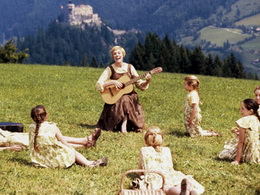 10. The Sound of Music (1965)
10. The Sound of Music (1965)
This movie played around with some fairly interesting components, what with the lush Austrian scenery, horny nuns, and Nazi invaders. Having obviously decided that a plot that focused on the confluence of love and war couldn’t possibly carry the weight of two whole hours, the picture turned instead to song. Yes, to fill gaps that might otherwise have been plugged by Panzer divisions making ninety miles a day and a back-alley Fascist network that was paving the way for invasion with murder, the audience got a full soundtrack of delightful family sing-alongs. Good Christ: what was going on in ’65? I mean, I know Kennedy had his head opened up a couple years earlier, and the country was generally feeling “escapist,” but why deny the people some proper WWII action when the table had pretty much already been set? Was the movie based on a pre-existing musical? Yes. Did the film have fairly serious expectations to fill as it concerned its stage predecessor? Most definitely. Does this mean a flick can’t screw around a little to make a painfully underutilized plot more interesting and dynamic, giving the audience something other than shattered expectations when the Von Trapp’s didn’t kill that greasy little cunt Rolf? Hell no! Give this movie some action that ties in to the monumentally historical events unfolding around the main characters, ditch the songs, and stick with what works: killing Nazis to escape to freedom. Speaking of freedom, we may as well mention the elephant in the room, for after this list’s posting and the beating this next movie’s about to get at my hands, Spielberg, Lucas, Coppola and the rest of the Hollywood elite will make sure I am cast into the abyss, all liberties lost to he who dares criticize…
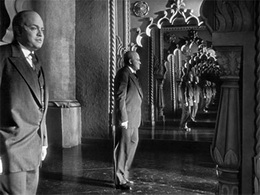 9. Citizen Kane (1941)
9. Citizen Kane (1941)
Indeed, there’s a lot to like in this film, yet in a way that puts it into an entirely different category than “The Sound of Music.” Truly, the innovate narrative structure, camerawork, and audio mixing put it into that rare class of film that defines the modern cinematic experience. To call this film a classic, however, is like claiming the Army Field Manual is an indispensable pillar of American literature. Let’s just be honest: while an admittedly important movie, its story is about as interesting as a barnacle convention. Though the movie dealt with a newspaper tycoon with money to burn and the world at his feet, the plot minced through tedious reviews, and re-reviews of the rich asshole’s love life. His love life! The film could have delved into any number of strikes he brutally repressed, or more details surrounding the wars he felt like starting with his newspaper. But no! Instead, the picture took a hard left directly off the shit-cliff into a shit-gulley, setting up very pretty shots with good cuts for a film that didn’t have the story to keep a person even remotely interested. It didn’t help that the film’s characters and the situations they were involved in register on the believability scale right on par with the expected fare in a daytime soap opera. Cartoonish in their presentation, Kane, his wives, and even the butler, acted with such ham-fisted amateur-hour proficiency that a person blushes, almost feeling sorry for the film before remembering how much blind devotion it elicits. The ultimate standard for modern filmmaking techniques and the Nouvelle Vague? Perhaps. Entertaining fare with an engaging plot and realistic performances? Not on your life.
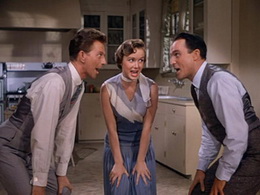 8. Singing In the Rain (1952)
8. Singing In the Rain (1952)
Speaking of foaming-at-the-mouth devotion for no conceivable reason, this sorry excuse for a movie has to get some ink, for nothing occurs throughout this picture that a half-hour sitcom episode couldn’t tidily wrap up. Personally, I couldn’t give a damn about the struggles of a successful movie star in the 1950s, and his headaches concerning famous girlfriends and studio hassles that revolved around the next big “talkie” release. Apparently back in the 50s people stared at clothes drying and watched the leaves change colors for entertainment, hence this exciting brand of storytelling got a bit of attention. After the advent of the flamethrower, however, you’d think this kind of shit would get shelved for more interesting fare, but alas, they still made this crap. And why? So that people could learn how to deceive a popular audience via lip-synching techniques and film slight-of-hand beneath the larger guise of a breezy romantic comedy? By all means, make a love story or a movie about the mid-20th century film industry, but if it’s going to stand up as “classic” 50 years later, don’t you think some endearing truth other than “love perseveres” should stand out? This movie was helpful in the grand scheme of things, however, which is why it’s not near the top slots. Indeed, this movie is proof that in order to make a buck with a film, all a person REALLY needs to do is choreograph a fancy dancing scene and slap together a non-threatening love triangle, and the money, adulation, and “classic” status will obediently fall into line.
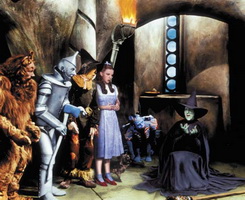 7. The Wizard of Oz (1939)
7. The Wizard of Oz (1939)
First off, why did we even go to Oz? Why didn’t Dorothy shack up with some lousy, good-for-nothing petty thief and borderline-masochist, going Bonnie and Clyde on the Midwest with her new beau to reclaim dog and honor? Seriously? Who gets a court order to take away a 12-year old’s dog after beating it with a rake? Setting up a great revenge thread that was woefully under-utilized, the film transitioned from there into an alternate universe where the streets were paved with gold and the only impediment to Dorothy’s total domination of the new realm was midgets and witches that immediately melted when introduced to liquids. Naïve country bumpkin that she was, Dorothy spent the rest of the movie opining about her Midwestern farm life, battling flying monkeys (which still terrify me to this day, unholy beasts that they are) and forming uneasy alliances with mutant lion, tin, and straw creatures. And for what? To get back to Kansas, where communities stood gutted by the Great Depression and dogs were taken spitefully from sweet-natured little girls? With a bucket of water and the support of the local Munchkin unions, Dorothy could have solidified a power base that would have lasted in perpetuity. Ultimately, the film was telling its audience that despite all indicators suggesting otherwise, a person should reinvest and commit to a political and economic system that was well into its eighth year of ruin. Though the movie was based on a novel with equally powerful subtext, at least the author of the book made no qualms about his metaphors and insinuations, presenting fairly obvious symbolic and thematic elements to his tale. Almost all of the book’s themes were discarded for the film, a picture that spoke volumes about the movie’s support of United States isolationist policies despite Nazi aggression in Poland, and a devastating war in China. Dorothy was the film’s presentation of U.S. policy at the time, one which refused direct intervention and global dominance, that is until the witch came across the pond, and started dropping bombs on Kansas (would have been perfect for the sequel). But by that point, everybody was willing to accept that the tale was little more than a feel-good musical about a girl, her dog, and a land called Oz that could have been Dorothy’s had she been provoked enough to take it.
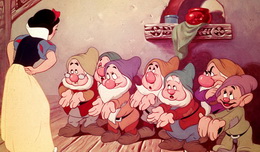 6. Snow White and the Seven Dwarfs (1937)
6. Snow White and the Seven Dwarfs (1937)
For a cartoon, this movie came with some pretty awesome assets: conspiracy, contract murder, deceit, poison, and even witchcraft. This brings us to our first problem, however. Mainly, this flick didn’t know what it wanted from itself. When you set up your story by introducing a woman looking to have the heart of an innocent young girl cut out and brought to her in a box, the first thing that comes to mind probably isn’t that you’d figure this as a sure-fire bet to capture the G-rated 5-12 year old demographic. Second, the movie gave us a comely young lass wandering into the bedroom of seven men living isolated in the middle of nowhere, providing nothing in the way of realistic resolution. And when I say “realistic resolution,” I mean “gang bang.” Come on, you really think seven dudes working like galley-slaves in the armpit of a diamond mine wouldn’t immediately turn out some tasty piece of ass that broke into their cottage and fell asleep on their beds? What are we even talking about, here? Third, where’s the revenge? Seriously! Some half-mad bitch of a stepmother puts a contract out on you and later tries to finish the job herself via poison, and a renegade bolt of lightning ultimately kills her? I take no issue with the fact that the movie is a cartoon, or even that it’s rife with extraneous musical numbers: but to set up a good character thread and abandon it so that dashing princes can arrive and NOT stab the crap out of something! Unforgiveable.
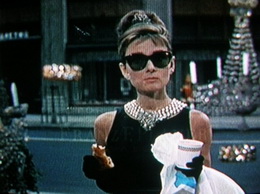 5. Breakfast at Tiffany’s (1961)
5. Breakfast at Tiffany’s (1961)
When I saw this movie, I kept waiting for the male lead to come to his senses, ditch the loopy bitch upstairs, get a cigar, and start working on making a plan come together. That Hannibal of all people had to suffer the indignity of a man checking his balls at the start of the first act makes this entire picture inexcusable. A fiendishly hot Audrey Hepburn though she may have been, she was a whore! Peppard’s character, on the other hand, was a writer with an endless train of gravy practically coming out of the tap via a rich, it-could-be-worse-looking socialite that wanted nothing more than to keep a man-slut on the side, even if that meant sharing him with other, younger, women. This guy had a gig where a woman was paying his bills and keeping him in style, allowing him to concentrate entirely on his writing while his sugar momma wasn’t even asking the guy to be exclusive. Crapping this divinely ordained arrangement down his leg so that he could chase a good-for-nothing cocktease harboring more issues than the Washington Post, the film’s lead ultimately got his prize in the end (a happy twist left out of the novel). But is that supposed to be a good thing? Wracked with guilt and anguish over her dead brother, mangled childhood, lost riches, and whore life, what kind of victory are we to assume for Hannibal and his new woman? He gave up his chance at getting some good ink time in without worry of bills or the taxman as a result of his “kept-man” status. Having thrown that away, and almost certainly in need of a real job to sustain his and the new girlfriend’s plush New York City lifestyle, what drab, sour existence can the audience expect from two people looking to accomplish little more than to keep from whoring themselves back out to high society to get by? Had the lead simply stuck it out a bit longer with the rich old broad to give him time to write and get established instead of chasing crazy high-end call girls, he might have ended up as more than the fractured shell of a man he almost certainly became.
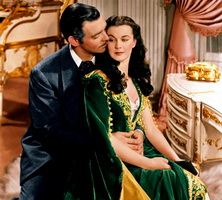 4. Gone With the Wind (1939)
4. Gone With the Wind (1939)
What a pain in the ass this movie is! There wasn’t a pragmatic, straight-thinking character in the whole friggin’ mess of a story: Even borderline-tough Rhett absolutely out of his mind as it concerned Scarlett. This didn’t put Clark Gable’s character into exclusive territory, however, as Ms. O’Hara was hopelessly in love with Ashley (a dude) who was already hooked up with Scarlett’s good friend Melanie. Throughout the course of the American Civil War and the subsequent reconstruction (both historical periods teeming with interesting plot possibilities) the movie looked only at the relationships of confused, hopelessly deranged maniacs, giving the audience plot twists that resembled a mediocre “Real World” episode. The whole thing played out like the narrative in a grocery store romance novel, Scarlett pining over some stupid asshole with a chick’s name while whoring herself out to whatever rich dickhead felt compelled to give the increasingly fat socialite a dick-tickle. By the time anybody came to their senses, the Civil War was over, children and parents had died, and three unrecoverable hours were gone. Though I do give some credit to Rhett for telling Scarlett to screw off at the end, it came too little too late. Had Gable’s character done this at the beginning of the film, it might instead have given the audience time to get to know the slick Reb. blockade runner and all-around bad-ass. Instead, we were forced to endure what felt like months of some incomprehensible love octagon with no real resolution except that everybody got screwed at the end. While I support so challenging a conclusion, this movie took pretty much the longest, most painful route to get to that conclusion, something the next film can certainly relate to …
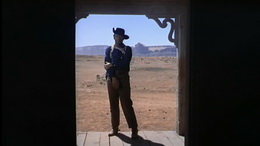 3. The Searchers (1956)
3. The Searchers (1956)
There are few “classics” out there that get as much positive attention while still embracing so striking a racist pose as this legendary western. While there were certainly moments of cinematic splendor in the movie that challenged audiences in a way that forced them to re-conceptualize their filmgoing experience (Director John Ford knew how to shoot and cut a good-looking picture.), the story was horrific on multiple levels. In a reversal of the actual scenario of menace to the western plains in the mid-19th century, it’s Native Americans and not whites that were terrorizing innocents in this picture, with John Wayne’s Ethan avenging ethnic-cleansing on behalf of his people. Despite the well-documented reality of the genocide perpetrated against these people, widely known even at the time of this picture’s release, the movie embraced the idea of the Comanche’s faceless savagery as seen most clearly through their Chief Scar. This antagonist’s very name represented his people’s depiction in the film, standing in as an ugly blemish upon the divinely sanctioned American expansion west. Disregarding the safety of the very woman he was charged to rescue on several occasions to exact his revenge on Scar and his people, the Duke did what came most natural to the man: killing Injuns in the name of racial purity. Going so far as to turn his pistol on “Debbie” after learning that she’d acclimated to Comanche society, it’s only after Ethan actually scalped another human being that he realized that maybe, possibly, he might have some issues. Never apologizing for his five-plus year struggle to prevent or otherwise avenge the crime of miscegenation, Wayne’s character leaves the frame in the final shot a triumphant hero, having returned a white woman to her “people.” Say what you will about “Birth of a Nation,” at least people universally recognize that that movie was putrid in message if not in form, something that cannot so easily be said about this or the following entry …
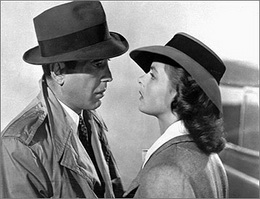 2. Casablanca (1942)
2. Casablanca (1942)
What a pussy! That bitch leaves Rick in Paris without a word of explanation, without an apology or even a see-you-later fuck, and he takes her back? I don’t care that her husband had escaped from a Nazi concentration camp: for all I care it could have been a goddamn whale! Once a woman runs out on a man, favors immediately die. Ladies, break a guy’s heart if you want, but never do either of the following things afterwards: leave them a pen as a parting gift, and/or come back later asking favors. Ingrid Bergman’s Ilsa batted her eyes at Rick for all of a minute and in no time the guy was arranging covert transport, lying to military police, and even shooting people to cover his ex-girlfriend’s tracks. And for what? This film did immeasurable damage to men for decades to follow, the reverberations of the catastrophe felt to this day. This movie informed a generation of women that they could freely abuse, use, leave, and re-use men without worry of retribution or refusal. Because of this film, women are still of the understanding that it’s okay to toy with a man’s emotions and grind his heart into inhalable powder, that even after shattering his life and re-emerging with a new guy, that the ex will still be there because that’s what “classic” men do. Well thanks a lot, Bogey! Because of your baffling lack of backbone and the immediate collapse of your resolve, men will forever suffer at the hands of cruel, lazy, inconsiderate women who think nothing of leaving a guy, parading the new product in front of his face, and begging favors from emotionally-crippled souls. Who else needs a drink?
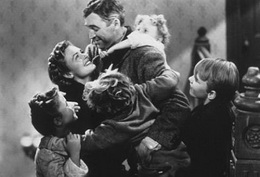 1. It’s a Wonderful Life (1946)
1. It’s a Wonderful Life (1946)
When it comes to unredeemable crocks of shit, it doesn’t get much more deceptive than Frank Capra’s most egregious assault against America, the flag, and apple pie. In his 2008 write-up, Wendell Jamieson said that “‘It’s a Wonderful Life’ is a terrifying, asphyxiating story about growing up and relinquishing your dreams,” making an excellent point about a movie that is practically on repeat every Christmas. Yes, on the holiday when people are feeling their most vulnerable to influence and sentimentality, this movie comes around like clockwork, pushing people toward a miserable existence that will not ultimately be saved by angels, faith, and the kindness of one’s community. No, in real life, the REAL world outside of Hollywood and Never-Never Land, there is no angel to stop you from taking a header off the bridge, no Dickens-esque retreat into an unseen present. For actual human beings living in the non-fiction realm, the sacrifice of ambition and one’s life’s pursuits, the seemingly endless series of compromises that extinguish the noblest aspirations of the soul: they destroy us lock, stock, and barrel. George’s dilemma before his encounter with Clarence was legitimate for a man who never realistically took stock of his life or what he truly wanted for himself. That he ended up turning on his children and spouse, emerging thereafter from a bar en route to a suicide bridge should come as no surprise to anybody who has traded the dreams of tomorrow for today’s familiar and convenient gratification. George realized on that bridge that his life had been for shit, and despite doing the technically “right” thing by staying behind and printing a sign on his back that read “doormat,” he had nothing to show for his existence than pending collections litigation, divorce, and homelessness. That this film is shown on television regularly, and on a recognized holiday that guarantees its capacity to influence children is astonishing and, unbelievably, not upsetting to nearly enough of you out there. For shame.





{ 21 comments }
Your lists are always entertaining warren, but I can’t help but think you’ve missed the point of some of these films (interesting take on the possibilities of wizard of oz though). Although I strongly disagree with some of your choices I like the central conceit of the list, which is whether a film termed “classic” deserves the title or whether we forgive it its flaws with age.
I love your lists Warren, and your points about the Wizard of Oz, The Searchers and It’s A Wonderful Life are valid (after the first time you see IAWL, it defintely gets cornier every time.) But I have to disagree with you on your point on Casablanca. Rick could have easily have left Llsa and Viktor in Casablanca for them to be arrested due to the fact that Llsa did treat him like shit, but he understands that he has to “man up” and put Llsa and Viktor on the plane and get them to safety to continue the fight against the Nazis. Rick understands that sometimes you have to be the bigger man and help stop the world from a greater force of evil, whether or not your feelings are hurt
haha, this list is AWESOME.
Fantastic!
You seem to be quite the provocateur, but your critiques seem to be derived from personal taste rather than drab filmmaking.
Warren, I can’t help but notice that your culturally separated from the people who made these films ‘classic.’ Not that I am much better. Your points are sophistrific, to coin a word, and mostly revolve around your own inability to understand the point of view of your parents.
to illistrate :
RE:
10. Anyone who can sing while shit like that is going down, their life is being turned on its head by repressed desires, while watching 10 or so children at the same time is worthy of praise and escape.
9. never saw it
8. never saw it
7. ok, valid points about taking over oz. but for those who never read the book, the movie stands as an adolescent girls’ dream of the world around her. (note the head trauma that precipitates it) [ooo i will suffer for that one if my girl ever finds out]
6. do you ever have sex? but on a more serious note : A fairy tale. children. Seriously.
5. Whores can band together and leave their life of slut-dom behind. a)Its never too late to be honest with yourself. oh and b) men do stupid things for girls.
4. see a) and b)
3. see a) and add: somethings cannot be apologized for. Some victories are empty.
2. see b) and above comment by will
1. see a) and add: Growing up sucks, but you do it or die.
Are you trying to be funny or do you really not understand that “Singing in the Rain” does not take place in the 1950’s but the 20’s or 30’s I can’t remember which but it ain’t the 50’s.
Just off the top of my head:
10. The Wild Bunch
9. Jubilee
8. L’Atalante
7. E.T.
6. The Birds
5. Last Temptation of Christ
4. One Flew Over the Cuckoos Nest
3. Kwaidan
2. Do the Right Thing
1. Rules of the Game
LOTs of speculation about Oz. Some say it was about the “Bonus marchers.” But the author must have SEEN Nostradamus like into the future.
“Sound of Music” was implausible! That Dick-head Austrian father.
How could he be such a shwindhundt..
and NOT be a shwindhundt?! (Nazi) Most Austrians WERE at the time.
Chris are those movies you think are classics that got it wrong?
It is my list of classics that I dislike yes. Rules of the Game and Do the Right Thing especially.
Chris- I may have to fight you over “Do the Right Thing.”
Spike Lee should have done the right thing and not made this movie. Haha.
This list is so ridiculously wrong on so many levels it’s staggering.
This is terrible! And by the way, Scarlett hated Melanie practically throughout the entire story.
I could be wrong, but I think that The Sound of Music was based on the real story of a singing Austrian family thus the movie focused on them singing……………
I disagree about Casablanca and Rick could have certainly toyed with Ilsa’s fate by leaving himself.
I guess that my taste in movies doesn’t jive with this site though, because I dont have Coen Brothers’ movies and characters at the top of every favorites list I have ever made.
JPL- Keep in mind that this list is a satire and it was written by a contributor before you go off all half-cocked, ok? There are a lot of lists (about half of them written by me) on this site with differing tastes. Thanks for reading, though.
Big thanks to Kenny, JPL, and Jim Smith – I’ve never felt more justified in anything I’ve ever written. That you douche-bags hated it this much means I must really be on to something. I’ll keep writing them if you keep hating them! Thanks!
I don’t hate your list you’re allowed to dislike any movie you want, but your main argument on a lot of these films is that they are not realistic. That argument for any work of fiction is retarded, it’s fiction, fantasy, not real meaning it doesn’t have to function under the rules of the real world. Say you didn’t like a movie because you found it boring but the “it’s not realistic” argument has no support.
Just thought i could add a suggestion. A film i have studies recently ‘double indemnity’ has a major flaw in the plot. After two meetings between our protagonist and his new fling, he seems to be so in love with her that he would stoop so low as to kill her husband even though he is against her suggested plan. Its overly rushed and just a bit to ridiculous for me.
No woman becomes a bitch by watching a movie. So don’t blame Casablanca for your problematic girlfriends! And don’t talk about women like we’re all the same. You get your little heart broken and now women are cruel, lazy, and inconsiderate. Of course men don’t have these traits.
Comments on this entry are closed.